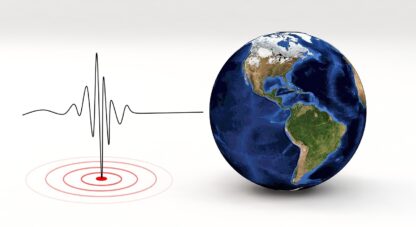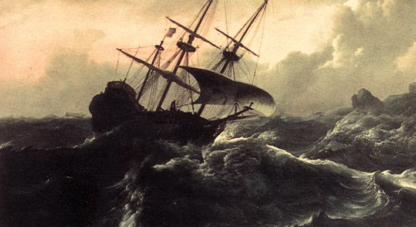View a Printable PDF Click Here
This month we spoke with Tomáš Sedláček, author of Economics of Good and Evil, published by Oxford Press. It’s a best-selling book in Czechoslovakia, and hopefully will be here in America. While it’s a book on economics, it’s also a book about all the things that drive economics, all the things that are part of economics. And rather than portraying economics as a dismal science, which is how we typically think of it, it is all of the things in life that we find significant and meaningful.
In America, we think of economics as dry and academic. It’s just mathematical models and a reduction to dollars and cents. But in fact it involves love and hate, gift and sacrifice, slavery. It’s the poetry of mythology.
That may sound crazy if you’ve never considered economics in those terms, but this is a man who finally has put together God, humanity, economics, mythology – the things that make us tick. When we go home and we play music or we dance with our kids, that’s also ideology and economics, strangely enough. And that’s the integration you’ll see in Tomáš Sedláček’s work.
So this month we present “A Conversation with a Polymath” – a Renaissance man, a multidisciplinary man who is conversant in life, not just a dry-as-dust excuse for state control that the state, its apologists, and thoughtless millions call “economics.” I think you’ll find his observations illuminating and fascinating, as we did. Here are some excerpts from his interview, which you can find in its entirety here.
David: Tomáš Sedláček, today you teach economics at Charles University in Prague. You’ve served on the national economic council in Prague. You were an economic advisor to Václav Havel, the first Czech president after the fall of communism, and that role was at the tender age of 23. Having read your book, Economics of Good and Evil, I can see why that invitation to serve with Václav Havel was made to you. I would like to explore many of the ideas that you have in your book, and perhaps we can start with just a brief overview. You have broken the book into two parts. In the first part you represent economic thought as having been influenced by philosophy, religion, and ethics throughout history. In the second part, you look at the 20th century and see that a wider social approach to economics has fallen out of favor. Today, the substitute is mathematical rationalism – a very mechanistic understanding of the world.
When we consider the financial markets today, we find retired economics professors in positions of prominence at most central banks, and these economists are working largely by the same playbook, attempting to prop up aggregate demand and enable the economies of the world to grow indefinitely. You were raised in a country where command and control dynamics were what drove the communist economic model. Would you unpack for us the current role of the central banker, or central planner, and tell us what set you on a different path than that of command and control economics at a young age?
Tomáš: Well, growing up in a communist regime, which broke down when I was twelve – so I am the last generation that still remembers it in some vivid form – you see the other ideologies a little bit more clearly than a person who has been born with an ideological spoon in his or her mouth. This is one of the few advantages of coming from a country that lived under communism.
Across most of the globe, governments have now adopted the economic growth model. This is a different thing than capitalism, and I don’t really criticize capitalism; I criticize growth capitalism. These are two completely different systems, although most people don’t distinguish between the two. Nevertheless, this growth capitalism has become the most ecumenical religion of the whole globe. Everybody believes in it, despite the culture or religion or anything else. And, of course, the guardians of this ideology are central bankers. These are the priests, the highly educated, the highly acclaimed members of our society – priests who are guiding the world. I would even say that they are much more important in strength than our presidents.
With regard to growth capitalism, we should discuss two things. The first is this current situation of zero interest rates. I remember I was giving a talk at the European Central Bank about the time they became the lenders of last resort. My speech was called “Believers of Last Resort,” because in Latin the word credo (credit) means belief – faith. So, central bankers are also playing the role of the priest in being the believers of last resort. When nobody else believes, it’s the central banks and the central bankers who must believe instead of the market. They offer zero interest rates. That means they have absolute belief in the future without any question, and this is exactly the message that must be given to an economy that is full of doubts because the faith of the markets has been shattered. Here come the priests of the central banks, saying, “We will give you our faith. We will be the believers of last resort.”
David: So, you have growth capitalism in contrast to capitalism – a very asymmetrical approach to monetary policy that entails central bankers exaggerating growth in the good times and fighting for growth when the economy is in a natural phase of contraction. If we look at Joseph, thousands of years ago, the biblical account of an economic cycle shows us what it looks like to “lean into the wind.” What lessons from that event do you think need to be brought forward to contemporary economic analysis and monetary policy-making?
Tomáš: This is a beautiful economic story. It’s the oldest account of a business cycle that we have in the historical record of mankind. It comes from Genesis, chapter 42. There, Joseph tells the Pharaoh that instead of having a dream about cows, what he really had was a macro-economic prediction for the 14 upcoming years. The first seven will be years of growth, then seven years of famine.
This was the description of a business cycle – the economy has a natural tendency to go up and to go down. So seven years of plenty would be followed by seven lean years. The advice that Joseph gave to Pharaoh was not to consume everything that grows in the good years, but save a part of it so that he had something called savings. Then in the bad years those savings would come in extremely handy, and he would be able to survive the famine. This is exactly what Pharaoh does. So that is the first thing for us to discuss.
The second thing to emphasize is quite interesting. This is a very, very old story, one of the oldest that we have of mankind. There were no universities at that time, no economics, no excel sheets, no field of economics. Yet the Egyptian society managed to go through a very severe economic crisis – much, much more severe than what we are experiencing now. And they managed to go through it without a single penny of debt. And that is yet another fiscal side of the problem with which we are dealing. The only way we are able to even think about how to deal with the crisis is to issue debt. We think in debt. Doing anything else is completely outside of our thinking.
So you see, my point here is that if we had followed such a simple rule as, “don’t try to maximize your growth, but possibly slow down your growth, slow down your consumption,” then we could have gone through this crisis with slightly increased budget debt, but not to the point that the economies are actually going to the proximity of bankruptcy.
David: So, by contrast, we have debts today that were not acquired in the context of crisis as a stopgap measure, but – whether it is at the level of private or corporate or governmental –debts are being accumulated in the context of abundance. What does that suggest to you?
Tomáš: Instead of saving during the good years, we have indebted our economies even further. It’s a certain fetish of growth. Even if we had growth we would still feel like it wasn’t enough. What we have done, both fiscally and monetarily, is sold stability in order to buy growth. This was the tradeoff of the GDP growth years we had. A huge part of it was artificial debt-driven growth. So we have accumulated these debts during the good years because we wanted more growth and we were selling stability, in this case fiscal stability. We were selling it and we were buying growth. And the problem is that we were successful. We created a system that can grow very quickly, but it can also become extremely unstable very quickly. Heavily indebted economies cannot take on any more debt, even in a situation when such debt would be necessary or justifiable. So, what needs to be done in the future is, again, when growth comes – and it will come – we must not spend it all on consumption, but start selling growth in order to buy back stability and to decrease the tremendous amount of debt that the government has.
* * *
This interview has been edited for flow and readability. The interview transcript in its entirety can be read here.
* * *















